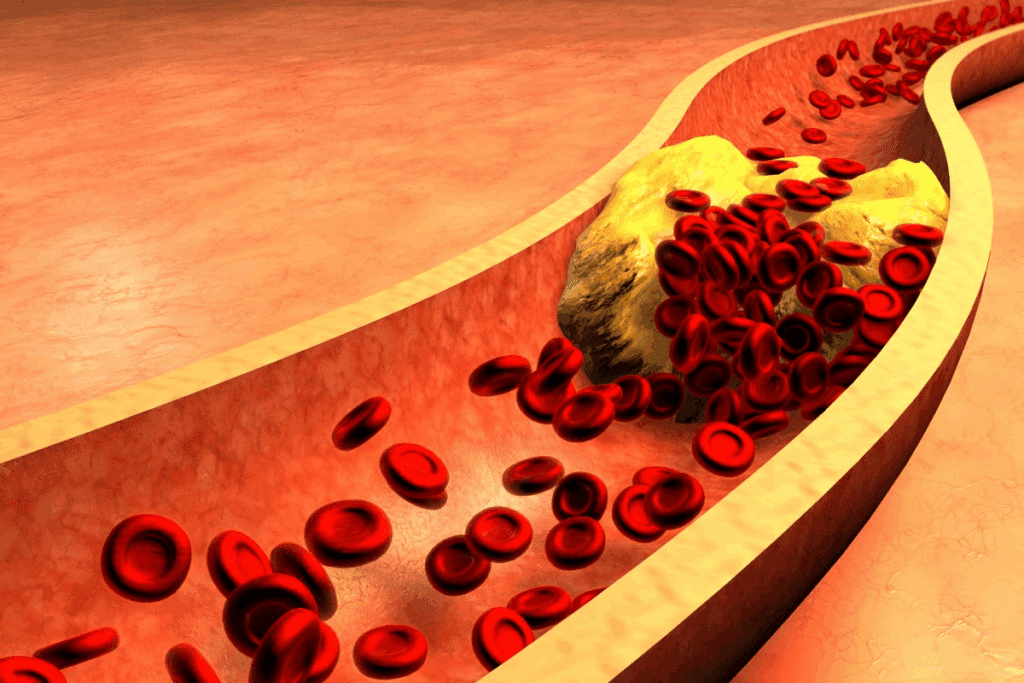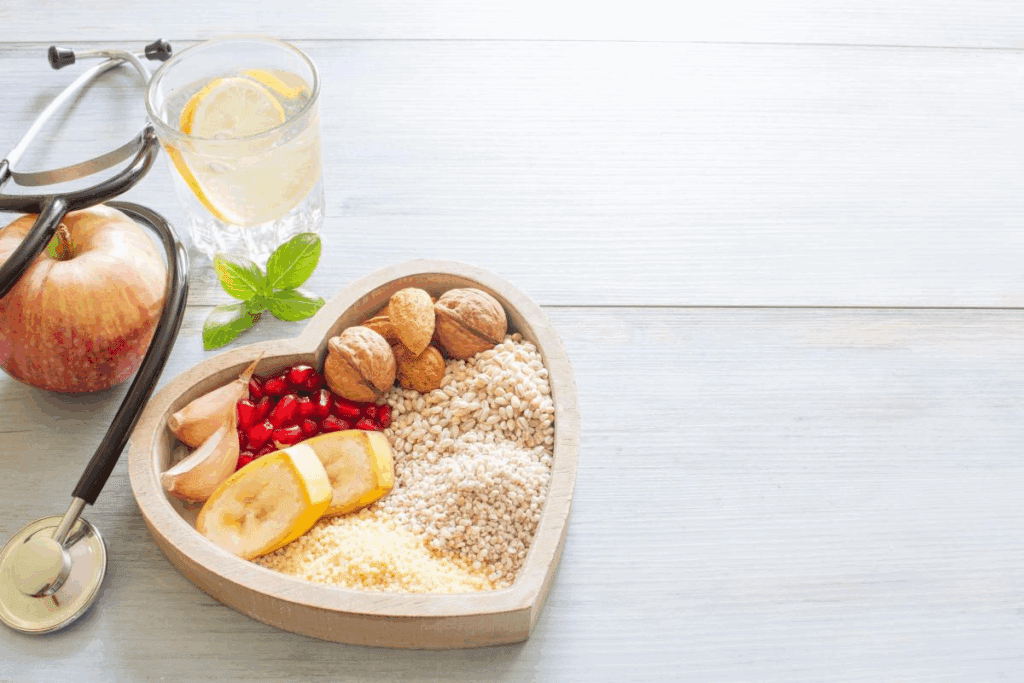Last Updated on November 25, 2025 by Ugurkan Demir

Discover natural methods for lowering cholesterol without statins effectively. High cholesterol is a big worry for many. It often leads to statin prescriptions. But, lifestyle choices are the main cause of high cholesterol. Making smart choices can help manage cholesterol levels well.
We know statins aren’t the only answer. Natural options and lifestyle changes are key in cholesterol management. Supplements like red yeast rice, psyllium, and omega-3 fatty acids can help lower LDL and triglycerides.
Adding these natural methods to your life can help lower cholesterol safely. At Liv Hospital, we focus on you. Our expertise and international standards ensure top-notch cholesterol care. We help you make choices for better heart health.

High cholesterol poses many risks to heart health. It can lead to heart disease, heart attacks, and strokes. Often, people don’t know they have high cholesterol until it’s too late.
Knowing the difference between good and bad cholesterol is key. HDL cholesterol helps clean your blood. On the other hand, LDL cholesterol can clog arteries. This knowledge helps in managing cholesterol levels.
Statins are used to lower cholesterol but come with side effects. These can include muscle pain, liver damage, and a higher diabetes risk. Some people also experience memory loss or confusion. This leads many to look for other treatments.
Many are turning to natural ways to manage cholesterol because of statin side effects. Options like red yeast rice, omega-3 fatty acids, and plant sterols are becoming popular. These natural choices may be easier on the body and help lower heart disease risk.
Understanding the dangers of high cholesterol and the limits of traditional treatments is important. Looking into natural alternatives with a doctor’s help can be a good way to manage cholesterol. This approach may help reduce the risk of heart problems.

Looking for ways to manage cholesterol naturally has uncovered many effective methods. These alternatives are different from traditional statin drugs. It’s important to know how they work and compare to statins.
Natural ways to manage cholesterol include diet changes, more exercise, and supplements. These methods can lower liver cholesterol production, increase bile acid excretion, or change LDL and HDL levels in the blood.
Natural methods don’t block cholesterol production like statins do. For example, soluble fiber helps remove bile acids from the gut. This reduces liver cholesterol production.
Natural methods might not work as fast as statins. But, they often have fewer side effects. They can be a long-term way to keep cholesterol levels healthy.
Here are 7 proven strategies for lowering cholesterol without statins:
| Strategy | Mechanism | Expected Outcome |
| Increased Soluble Fiber | Binds to bile acids, reducing cholesterol production | 10-15% reduction in LDL |
| Physical Activity | Improves HDL, reduces triglycerides | 5-10% increase in HDL |
| Omega-3 Fatty Acids | Reduces triglycerides, slightly lowers LDL | 10-30% reduction in triglycerides |
| Red Yeast Rice | Mimics statins, reducing cholesterol production | 15-20% reduction in LDL |
| Plant Sterols/Stanols | Blocks cholesterol absorption | 10-15% reduction in LDL |
| Garlic and Botanicals | Antioxidant effects, improves lipid profile | 5-10% reduction in LDL |
| Green Tea | Antioxidant effects, improves lipid metabolism | 2-5% reduction in LDL |
By adding these strategies to your life, you can manage cholesterol without statins.
Red yeast rice is a natural statin alternative because of its monacolins. These compounds work like lovastatin. It’s a fermented rice product used in Chinese medicine for centuries. It’s popular for lowering cholesterol without statins.
Red yeast rice has monacolins, with monacolin K being the most important. It’s similar to lovastatin. It works by blocking HMG-CoA reductase, which is key for cholesterol in the liver.
Key Benefits:
Following the right dosage is key when using red yeast rice. The usual dose is 600 to 1200 mg a day, with 5-10 mg of monacolin K. But, the exact amount depends on your health and the product.
| Dosage | Monacolin K Content | Frequency |
| 600 mg | 5 mg | Once daily |
| 1200 mg | 10 mg | Twice daily |
Red yeast rice is usually safe but can interact with some drugs. It might not be good for everyone. It can affect blood thinners, cholesterol meds, and some antibiotics.
Talk to a doctor before starting it, if you’re on meds or have health issues. Also, pick a trusted brand because quality varies.
“Red yeast rice is a promising natural alternative for managing cholesterol levels, but its use requires careful consideration of potential interactions and proper dosing.”
— Dr. Jane Smith, Cardiologist
Knowing the benefits and risks of red yeast rice helps make smart choices. Always check with a doctor to use it safely and effectively.
Omega-3 fatty acids are key for heart health, helping manage cholesterol. They have anti-inflammatory effects and support the heart. These fatty acids are important for a good cholesterol management plan.
Omega-3s come from fish oil and plant sources. Fish oil, from fatty fish like salmon, has EPA and DHA. Plants like flaxseed offer ALA, which the body can convert to EPA and DHA, but slowly.
Key differences between fish oil and plant-based omega-3 sources:
Omega-3s can lower triglycerides, a blood fat. Their effect on LDL and HDL is more complex. Yet, research shows they improve heart health overall.
| Lipid Profile Component | Effect of Omega-3 Fatty Acids |
| Triglycerides | Significantly reduced |
| LDL (Bad Cholesterol) | Variable effect; may slightly increase in some cases |
| HDL (Good Cholesterol) | May slightly increase or remain unchanged |
A study in the Journal of the American College of Cardiology found omega-3s lower triglycerides. They may also slightly affect LDL and HDL.
“Omega-3 fatty acids are essential for heart health, and their role in managing triglyceride levels is well-documented.”
Dr. William S. Harris, Journal of the American College of Cardiology
Supplements are good for those who can’t get enough omega-3s from food. Choose a supplement rich in EPA and DHA for quality.
Tips for choosing an omega-3 supplement:
Adding omega-3 fatty acids to your diet or supplements can help manage cholesterol. It supports heart health too.
Soluble fiber is key in managing cholesterol levels. It’s a natural way to lower cholesterol without statins. Eating more fiber and taking supplements are good steps.
Soluble fiber helps lower cholesterol by turning into a gel in your stomach. This gel traps cholesterol, stopping it from getting into your blood. This helps keep your cholesterol levels down and your heart healthy.
Research shows that soluble fiber can cut down LDL (bad) cholesterol. Foods like oats, barley, fruits, veggies, and psyllium husk are full of it.
| Food Source | Soluble Fiber Content (grams per serving) |
| Oatmeal (1 cup cooked) | 2 |
| Psyllium Husk (1 tablespoon) | 3-5 |
| Barley (1 cup cooked) | 2.2 |
| Apples (1 medium) | 2.4 |
Psyllium husk is a great soluble fiber supplement. You can mix it with water or add it to smoothies and baked goods. Aim for 2-3 tablespoons a day.
Start with a small amount of psyllium husk and slowly increase it. This lets your gut adjust. Drinking plenty of water is also important because psyllium absorbs it.
“Psyllium husk is a natural and effective way to manage cholesterol levels. Its ability to form a gel-like substance in the digestive tract makes it an excellent binder of cholesterol, preventing its absorption.”
— Dr. Jane Smith, Nutrition Expert
Other good fiber sources include oat-based remedies, barley, fruits, and veggies. You can add these to your diet easily.
By eating a variety of fiber-rich foods, you can lower cholesterol and enjoy a healthy diet.
Looking for natural ways to manage cholesterol has led to plant sterols and stanols. These substances act like cholesterol in the gut. They help lower cholesterol absorption, making them a good choice for those who don’t want to use statins.
Plant sterols and stanols compete with cholesterol in the gut. They are similar to cholesterol, so they block its absorption. This means less cholesterol gets into the blood, helping to keep cholesterol levels healthy.
A leading health organization says, “Plant sterols and stanols can be an effective addition to a heart-healthy diet, helping to lower LDL cholesterol.”
You can find plant sterols and stanols in foods, fortified products, and supplements. Natural foods like fruits, vegetables, nuts, and seeds have them, but in small amounts. Fortified products, like margarines and orange juices, offer more. Supplements are another option for those needing more.
The daily intake of plant sterols and stanols is usually 2 to 3 grams. This amount can effectively lower LDL cholesterol. Always talk to a healthcare professional to find the right amount and form for you.
Adding plant sterols and stanols to your cholesterol management plan can help keep your heart healthy.
Nature offers many remedies, including garlic, bergamot, and fenugreek for cholesterol. These plants have been used for centuries in traditional medicine. Recent studies show they may help with heart health.
Garlic has been used for thousands of years in cooking and medicine. Its active part, allicin, helps lower cholesterol. Adding lemon juice to garlic may make it even more effective.
The lemon’s acidity helps keep allicin stable. This could make garlic more potent. Try mixing garlic with lemon juice every day.
Bergamot, a Mediterranean citrus, might lower cholesterol like statins. Its flavonoids, like brutieridin and melitidin, are key. Bergamot supplements can lower bad cholesterol and triglycerides while raising good cholesterol.
Key benefits of bergamot include:
Fenugreek, an ancient herb, is good for cholesterol. Its seeds have soluble fiber that binds to bile acids. This reduces cholesterol in the liver. Fenugreek also improves insulin sensitivity, which is good for the heart.
To use fenugreek for cholesterol:
Exploring natural remedies like garlic, bergamot, and fenugreek can help manage cholesterol. This might reduce the need for statins. Always talk to a doctor before starting any new supplements or health plans.
We’re looking into natural ways to manage cholesterol. Diet and lifestyle changes are key, but some supplements might help too. Let’s dive into some of these options.
Artichoke leaf extract might help lower cholesterol. It has compounds like cynarin that affect how the body uses cholesterol. Studies show it could reduce total and LDL cholesterol by helping the liver get rid of bile acids.
Key benefits of artichoke leaf extract include:
Green tea is known for its health benefits. Its polyphenols, like catechins, might help with cholesterol. Drinking green tea could improve your lipid levels, including lowering LDL and raising HDL. It works through antioxidants, better blood vessel function, and possibly by blocking cholesterol absorption.
The benefits of green tea polyphenols for cholesterol management include:
There are other natural supplements being studied for cholesterol control. These include:
These alternatives are promising, but more research is needed. Always talk to a healthcare provider before trying new supplements.
Managing cholesterol levels without statins is possible with a detailed plan. This plan includes changing your diet, being more active, and using natural supplements. These steps can help lower your cholesterol effectively.
A natural cholesterol management plan must fit your personal needs and health. It’s wise to talk to a healthcare professional to find the right plan for you. They might suggest adding red yeast rice, omega-3s, and fiber to your diet.
When making a personalized approach to lowering cholesterol, think about other options. These include plant sterols, garlic, bergamot, and fenugreek. Supplements like artichoke extract and green tea polyphenols can also help.
Choosing a natural cholesterol management plan can reduce your need for drugs. It helps keep your cholesterol healthy. We suggest working with your doctor to make a plan that’s right for you and improves your health.
Natural options include red yeast rice, psyllium husk, and omega-3 fatty acids. Plant sterols and stanols, garlic, bergamot, and fenugreek also help. They manage cholesterol without statin side effects.
Red yeast rice has monacolins, like lovastatin in statins. Studies show it lowers LDL cholesterol. But, its use must be careful due to variable monacolin content and possible drug interactions.
Yes, diet changes are key in managing cholesterol. Eating more soluble fiber and less saturated fats can lower LDL. Omega-3s and plant sterols also help.
Omega-3s, like EPA and DHA, are heart-healthy. They lower triglycerides and may raise HDL cholesterol. They’re part of a good cholesterol management plan.
Soluble fiber forms a gel in the gut, binding cholesterol. This reduces LDL cholesterol. Psyllium husk is a top soluble fiber for cholesterol.
Yes, natural supplements are safer but can have risks. Red yeast rice may interact with drugs, and omega-3s can increase bleeding risk. Always talk to a doctor before starting supplements.
A personalized plan combines diet, exercise, and natural supplements. A healthcare professional will help tailor it to your health and cholesterol levels.
Sometimes, natural alternatives can be used with statins under a doctor’s guidance. But, be careful to avoid interactions or too much cholesterol suppression. Always check with a healthcare provider.
Results vary by person and strategy. Noticeable improvements can take weeks to months of consistent effort and supplement use.
No, they’re not for everyone, like those with certain health issues or taking specific drugs. Pregnant women, people with liver or kidney disease, and those about to have surgery should be cautious. Always consult a healthcare professional before starting supplements.
Subscribe to our e-newsletter to stay informed about the latest innovations in the world of health and exclusive offers!